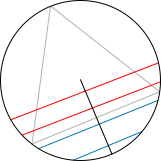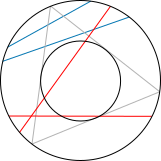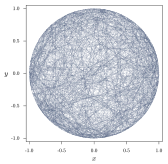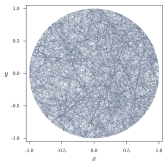The Bertrand paradox is a problem within the classical interpretation of probability theory. Joseph Bertrand introduced it in his work Calcul des probabilités (1889) as an example to show that probabilities may not be well defined if the mechanism or method that produces the random variable is not clearly defined.
Bertrand's formulation of the problem
Bertrand gave three arguments, all apparently valid, yet yielding different results.
Random chords, selection method 1; red = longer than triangle side, blue = shorter
The "random endpoints" method: Choose two random points on the circumference of the circle and draw the chord joining them. To calculate the probability in question imagine the triangle rotated so its vertex coincides with one of the chord endpoints. Observe that if the other chord endpoint lies on the arc between the endpoints of the triangle side opposite the first point, the chord is longer than a side of the triangle. The length of the arc is one third of the circumference of the circle, therefore the probability that a random chord is longer than a side of the inscribed triangle is 1/3.
Random chords, selection method 2
The "random radius" method: Choose a radius of the circle, choose a point on the radius and construct the chord through this point and perpendicular to the radius. To calculate the probability in question imagine the triangle rotated so a side is perpendicular to the radius. The chord is longer than a side of the triangle if the chosen point is nearer the center of the circle than the point where the side of the triangle intersects the radius. The side of the triangle bisects the radius, therefore the probability a random chord is longer than a side of the inscribed triangle is 1/2.
- Random chords, selection method 3
The "random midpoint" method: Choose a point anywhere within the circle and construct a chord with the chosen point as its midpoint. The chord is longer than a side of the inscribed triangle if the chosen point falls within a concentric circle of radius 1/2 the radius of the larger circle. The area of the smaller circle is one fourth the area of the larger circle, therefore the probability a random chord is longer than a side of the inscribed triangle is 1/4.
The selection methods can also be visualized as follows. A chord which is not a diameter is uniquely identified by its midpoint. Each of the three selection methods presented above yields a different distribution of midpoints. Methods 1 and 2 yield two different nonuniform distributions, while method 3 yields a uniform distribution. On the other hand, if one looks at the images of the chords below, the chords of method 2 give the circle a homogeneously shaded look, while method 1 and 3 do not.
Midpoints of the chords chosen at random using method 1
|
Midpoints of the chords chosen at random using method 2
|
Midpoints of the chords chosen at random using method 3
|
Chords chosen at random, method 1
|
Chords chosen at random, method 2
|
Chords chosen at random, method 3
|
Classical solution
The problem's classical solution hinges on the method by which a chord is chosen "at random". It turns out that if, and only if, the method of random selection is specified, does the problem have a well-defined solution. This is because each different method has a different underlying distribution of chords. The three solutions presented by Bertrand correspond to different selection methods, and in the absence of further information there is no reason to prefer one over another; accordingly the problem as stated has no unique solution.An example of how to make the solution unique is to specify that the endpoints of the chord are uniformly distributed between 0 and c, where c is the circumference of the circle. This distribution is the same as that in Bertrand's first argument, and the resulting unique probability is 1/3.
This and other paradoxes of the classical interpretation of probability justified more stringent formulations, including frequentist probability and subjectivist Bayesian probability.
Jaynes's solution using the "maximum ignorance" principle
In his 1973 paper "The Well-Posed Problem", Edwin Jaynes proposed a solution to Bertrand's paradox, based on the principle of "maximum ignorance"—that we should not use any information that is not given in the statement of the problem. Jaynes pointed out that Bertrand's problem does not specify the position or size of the circle, and argued that therefore any definite and objective solution must be "indifferent" to size and position. In other words: the solution must be both scale and translation invariant.To illustrate: assume that chords are laid at random onto a circle with a diameter of 2, for example by throwing straws onto it from far away. Now another circle with a smaller diameter (e.g., 1.1) is laid into the larger circle. Then the distribution of the chords on that smaller circle needs to be the same as on the larger circle. If the smaller circle is moved around within the larger circle, the probability must not change either. It can be seen very easily that there would be a change for method 3: the chord distribution on the small red circle looks qualitatively different from the distribution on the large circle:
However, Jaynes did not just use invariances to accept or reject given methods: this would leave the possibility that there is another not yet described method that would meet his common-sense criteria. Jaynes used the integral equations describing the invariances to directly determine the probability distribution. In this problem, the integral equations indeed have a unique solution, and it is precisely what was called "method 2" above, the random radius method.
In a 2015 article, Alon Drory claims that Jaynes' principle can also yield Bertrand's other two solutions. Drory argues that the mathematical implementation of the above invariance properties is not unique, but depends on the underlying procedure of random selection that one uses. He shows that each of Bertrand's three solutions can be derived using rotational, scaling, and translational invariance, concluding that Jaynes' principle is just as subject to interpretation as the principle of indifference itself.
Physical experiments
"Method 2" is the only solution that fulfills the transformation invariants that are present in certain physical systems—such as in statistical mechanics and gas physics—as well as in Jaynes's proposed experiment of throwing straws from a distance onto a small circle. Nevertheless, one can design other practical experiments that give answers according to the other methods. For example, in order to arrive at the solution of "method 1", the random endpoints method, one can affix a spinner to the center of the circle, and let the results of two independent spins mark the endpoints of the chord. In order to arrive at the solution of "method 3", one could cover the circle with molasses and mark the first point that a fly lands on as the midpoint of the chord. Several observers have designed experiments in order to obtain the different solutions and verified the results empirically.Recent developments
In his 2007 paper, "Bertrand’s Paradox and the Principle of Indifference", Nicholas Shackel affirms that after more than a century the paradox remains unresolved, and continues to stand in refutation of the principle of indifference. Also, in his 2013 paper, "Bertrand’s paradox revisited: Why Bertrand’s ‘solutions’ are all inapplicable", Darrell P. Rowbottom shows that Bertrand’s proposed solutions are all inapplicable to his own question, so that the paradox would be much harder to solve than previously anticipated.Shackel emphasizes that two different approaches have been generally adopted so far in trying to solve Bertrand's paradox: those where a distinction between non-equivalent problems was considered, and those where the problem was assumed to be a well-posed one. Shackel cites Louis Marinoff as a typical representative of the distinction strategy, and Edwin Jaynes as a typical representative of the well-posing strategy.
However, in a recent work, "Solving the hard problem of Bertrand's paradox", Diederik Aerts and Massimiliano Sassoli de Bianchi consider that a mixed strategy is necessary to tackle Bertrand's paradox. According to these authors, the problem needs first to be disambiguated by specifying in a very clear way the nature of the entity which is subjected to the randomization, and only once this is done the problem can be considered to be a well-posed one, in the Jaynes sense, so that the principle of maximum ignorance can be used to solve it. To this end, and since the problem doesn't specify how the chord has to be selected, the principle needs to be applied not at the level of the different possible choices of a chord, but at the much deeper level of the different possible ways of choosing a chord. This requires the calculation of a meta average over all the possible ways of selecting a chord, which the authors call a universal average. To handle it, they use a discretization method inspired by what is done in the definition of the probability law in the Wiener processes. The result they obtain is in agreement with the numerical result of Jaynes, although their well-posed problem is different from that of Jaynes.










